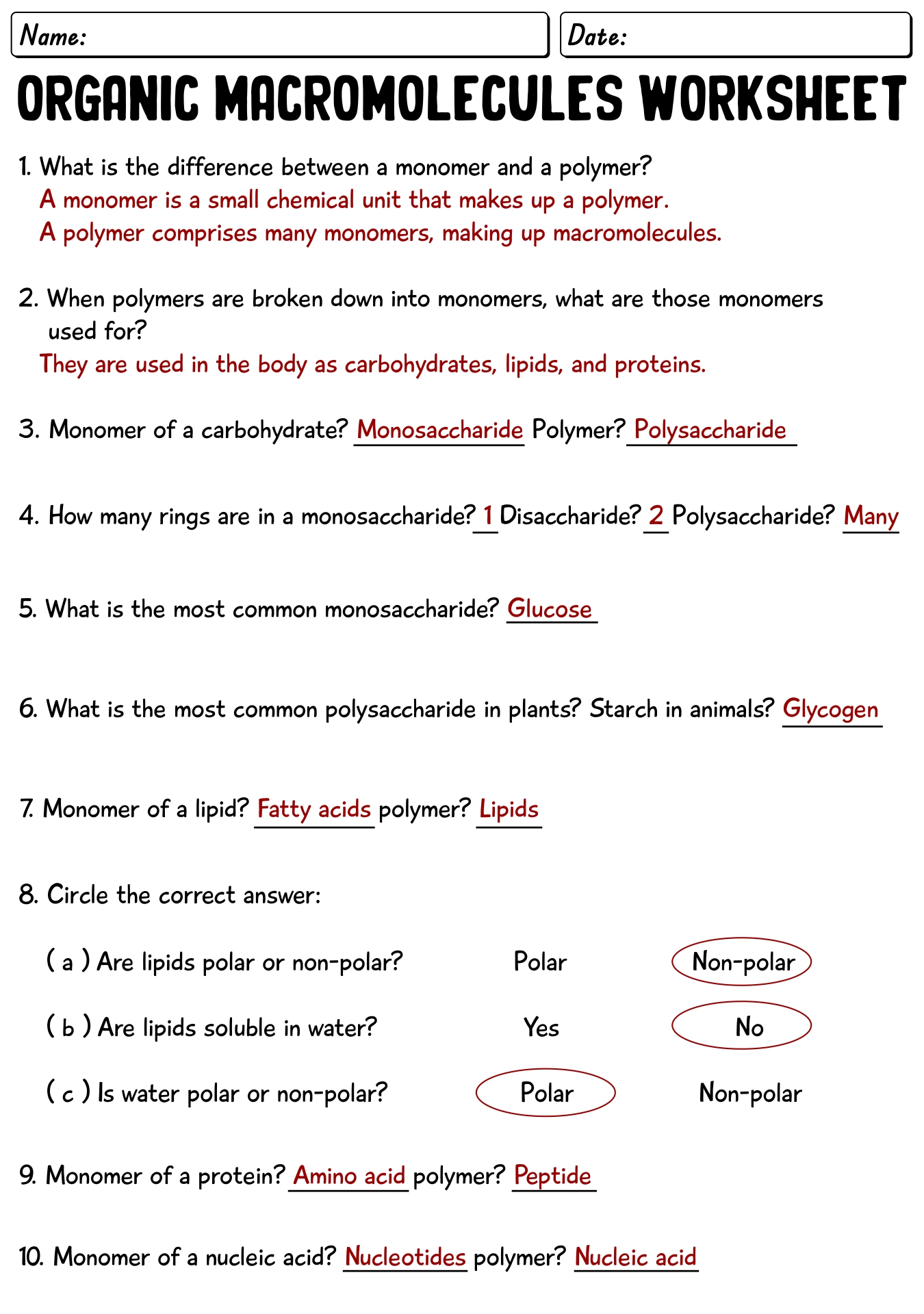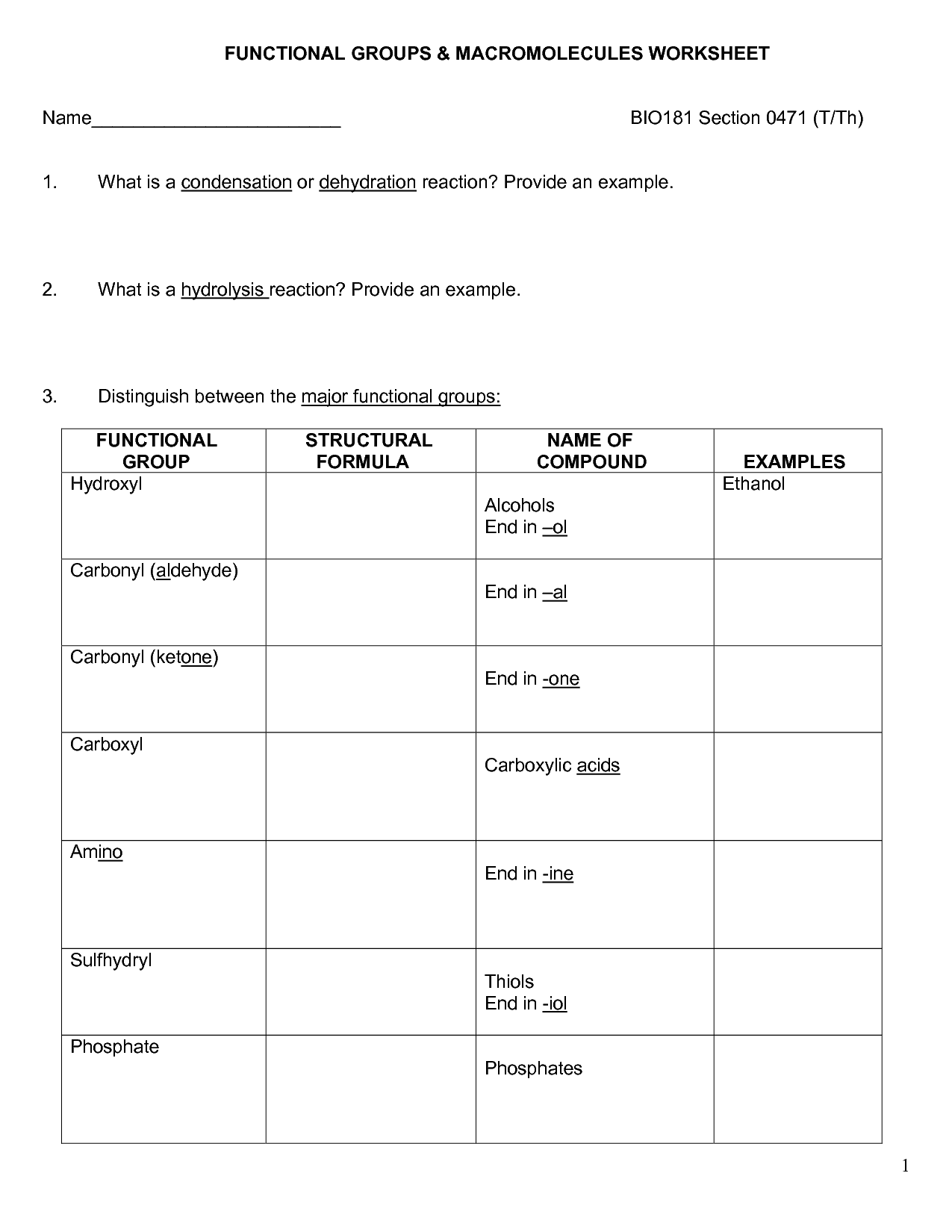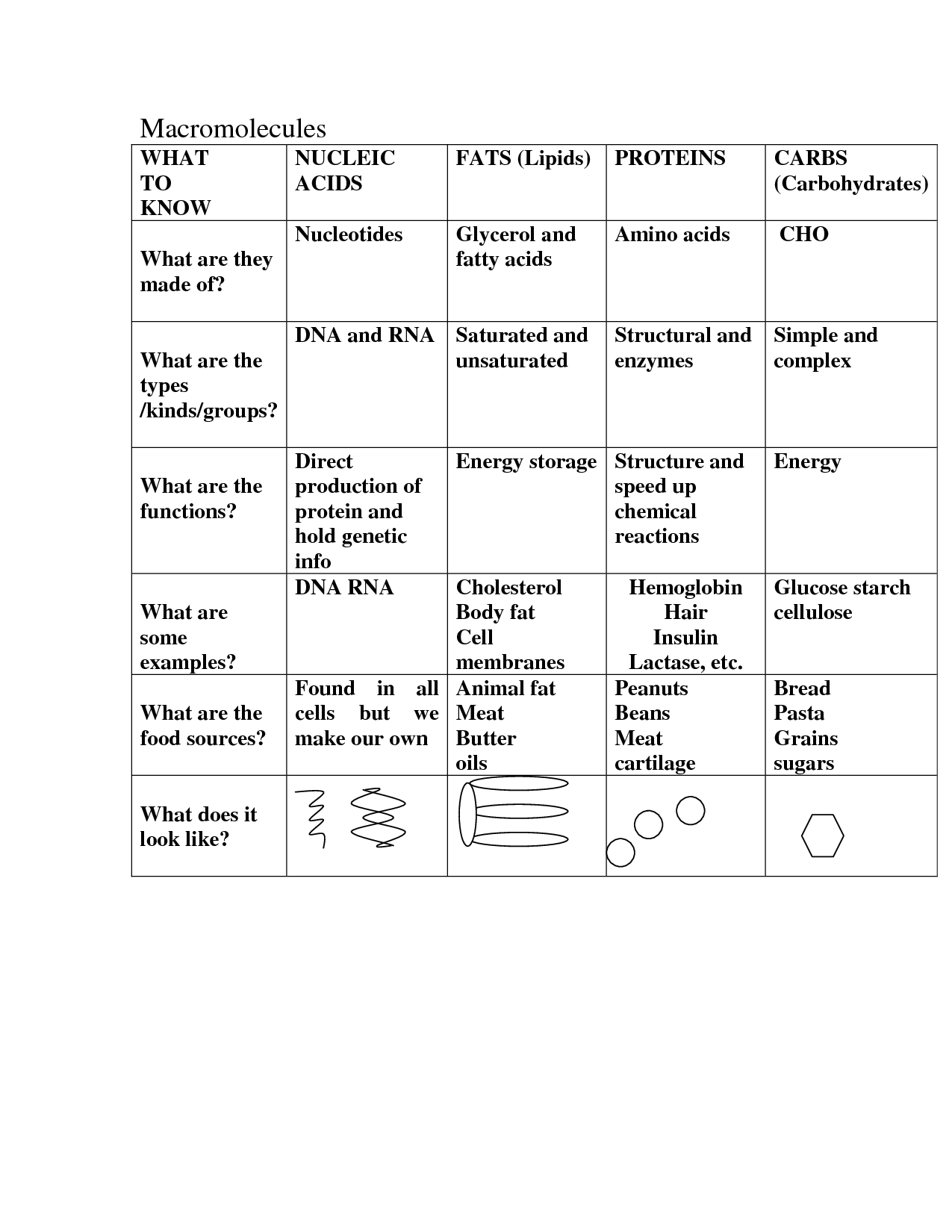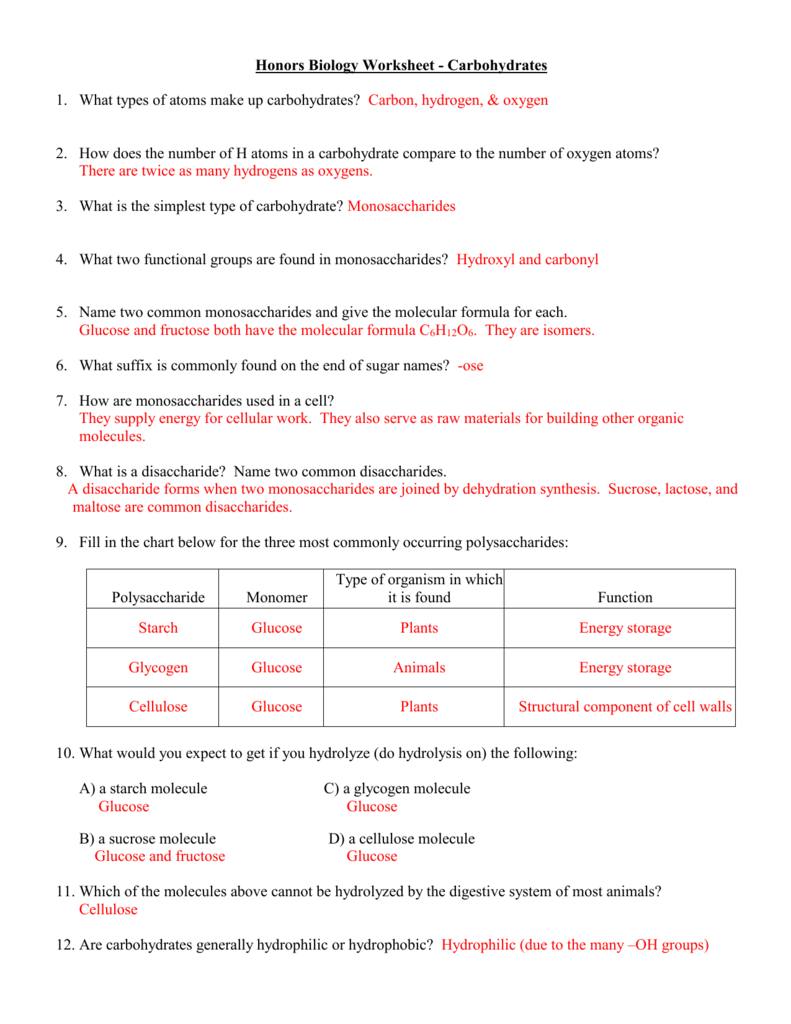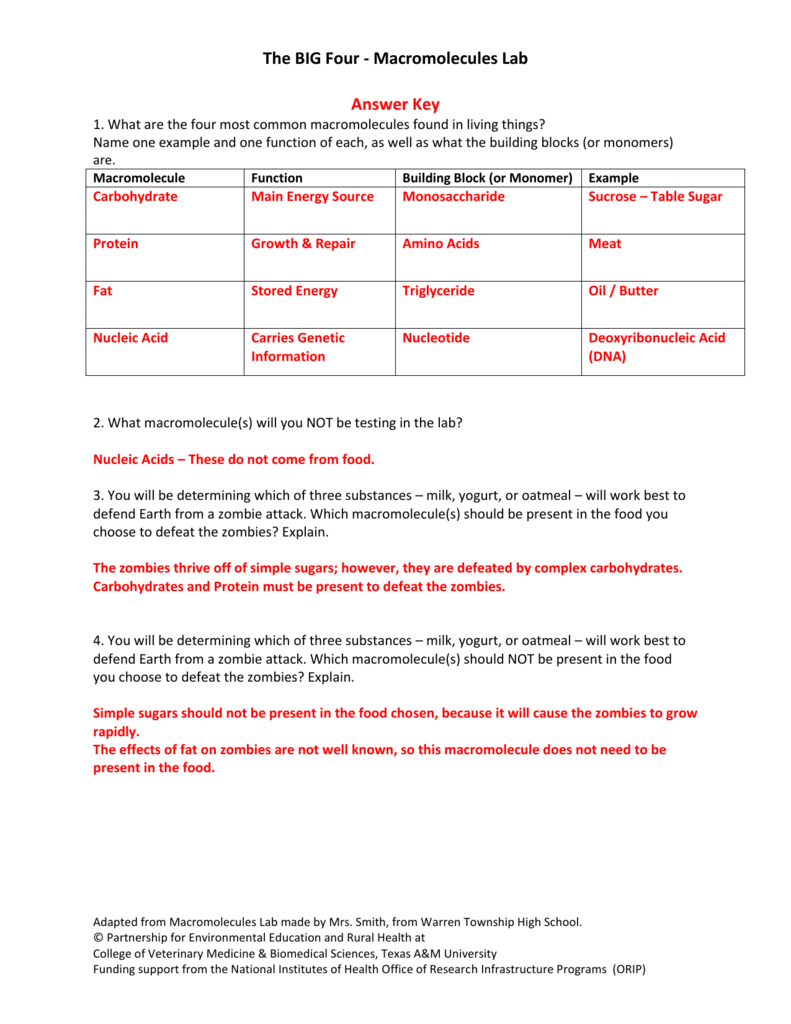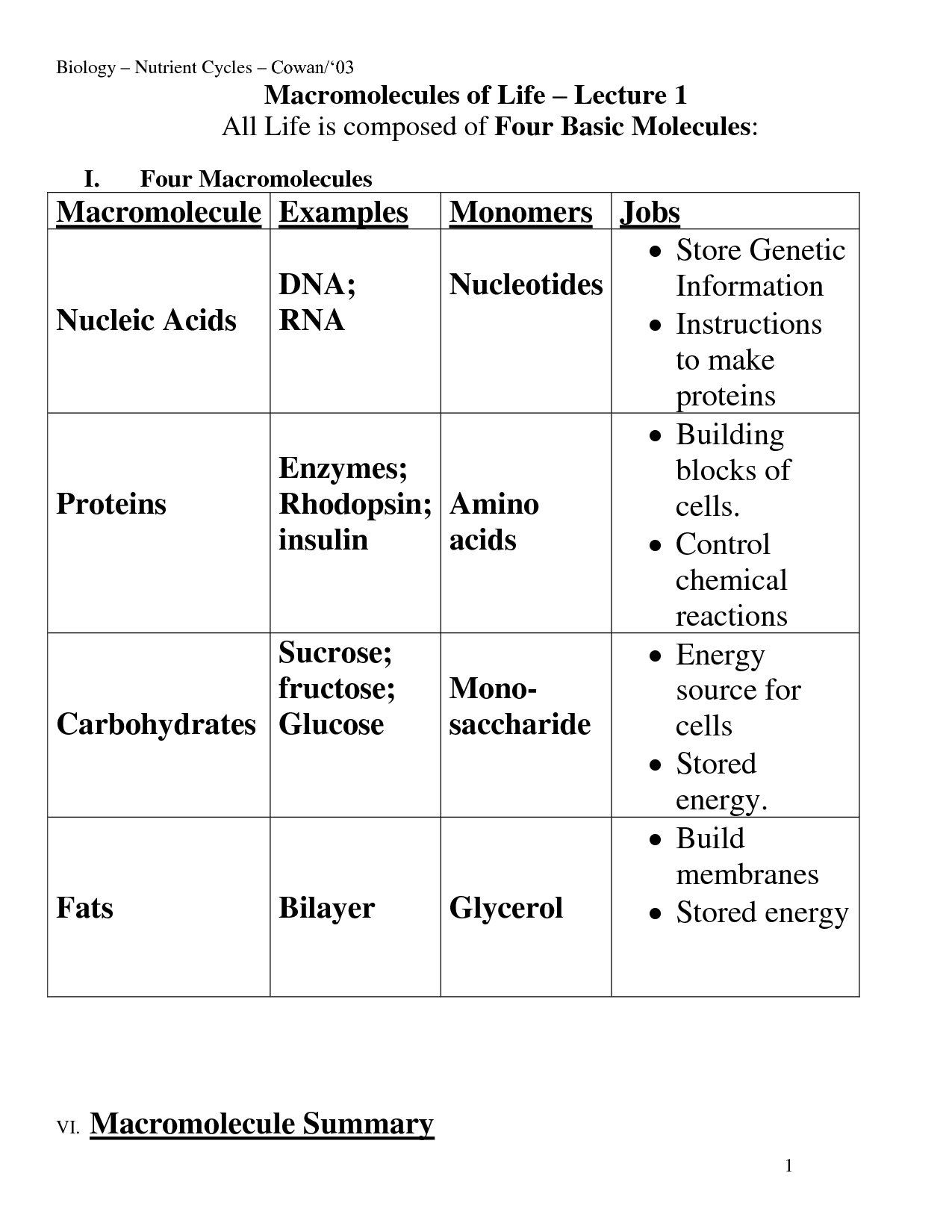Macromolecules Of Life Worksheet Answers
Macromolecules Of Life Worksheet Answers - Explain the relationship between monomers and polymers and explain how these molecules are related to the “unity and diversity of life.” explain how. Energy storage for plants cellulose:. Web there are four classes of macromolecules that constitute all living matter: Carbohydrates, lipids, proteins, and nucleic acids. Review read through each section and answer the following questions organic molecules are the molecules which exist in all living things. Name the 4 main classes of macromolecules (organic molecules) & tell what elements each contains. A sugar ( called deoxyribose) 2. Help your students review and assess how prepared they are for the big test!. Web building blocks of life worksheet answer key.docx. Web assign the worksheet for homework, an in class activity, or even as an emergency sub plan. Name the 4 main classes of macromolecules (organic molecules) & tell what elements each contains. Web macromoleculesclassifying macromolecules for high school biology. Class elements h o 2. Web with quizizz, teachers can create worksheets to help students learn about macromolecules, the building blocks of life. Carbohydrates, lipids, proteins, and nucleic acids. Web assign the worksheet for homework, an in class activity, or even as an emergency sub plan. Web macromoleculesclassifying macromolecules for high school biology. Carbohydrates, lipids, proteins, and nucleic acids. Web with quizizz, teachers can create worksheets to help students learn about macromolecules, the building blocks of life. Andersen walks pupils takes the major macromolecules and how they’re constructed. • students will compare and contrast. Web with quizizz, teachers can create worksheets to help students learn about macromolecules, the building blocks of life. This worksheet reviews monomers and polymers of the 4 types of macromolecules (proteins, nucleic. Review read through each section and answer the following questions organic molecules are the molecules which exist in all living things. These. Web this two page worksheet can be used as classwork, homework, or a quiz. In the first part, students examine the protein, fat, and. Some of the worksheets for this concept are biology macromolecules work and. Review read through each section and answer the following questions organic molecules are the molecules which exist in all living things. 1.what is the. These will get you all set to learn more about the different types of macromolecules. The nitrogen bonded to the two carbon atoms 3.the four lines surrounding the c represent. Web this activity explores how lions and elephants use macromolecules to grow and maintain homeostasis. • students will compare and contrast. Web learn about monomers, polymers, dehydration synthesis, and hydrolysis. Web with quizizz, teachers can create worksheets to help students learn about macromolecules, the building blocks of life. Web macromoleculesclassifying macromolecules for high school biology. Energy storage for plants cellulose:. One of 4 bases ( adenine, guanine, cytosine, thymine). Web start your moral off with this exploratory video! Web with quizizz, teachers can create worksheets to help students learn about macromolecules, the building blocks of life. Class elements h o 2. Web they are large polymers typically used for storage and structural purposes. Web building blocks of life worksheet answer key.docx. Web assign the worksheet for homework, an in class activity, or even as an emergency sub plan. A phosphate ( 1 phosphorus atom joined to 4 oxygen atoms). Web learn about monomers, polymers, dehydration synthesis, and hydrolysis reactions! While they have different structures and functions,. • students will identify the functions of each macromolecule. Explain the relationship between monomers and polymers and explain how these molecules are related to the “unity and diversity of life.” explain how. Name the 4 main classes of macromolecules (organic molecules) & tell what elements each contains. A sugar ( called deoxyribose) 2. Andersen walks pupils takes the major macromolecules and how they’re constructed. Students answer introductory questions about the four macromolecules. Web assign the worksheet for homework, an in class activity, or even as an emergency sub plan. A sugar ( called deoxyribose) 2. Help your students review and assess how prepared they are for the big test!. • students will be able to name the four types of macromolecules. Carbohydrates, lipids, proteins, and nucleic acids. While they have different structures and functions,. Students answer introductory questions about the four macromolecules. • students will identify the functions of each macromolecule. A sugar ( called deoxyribose) 2. Web macromoleculesclassifying macromolecules for high school biology. 1.what is the relationship between glucose, fructose, and galactose? Web they are large polymers typically used for storage and structural purposes. Name the 4 main classes of macromolecules (organic molecules) & tell what elements each contains. Web learn about monomers, polymers, dehydration synthesis, and hydrolysis reactions! Carbohydrates, lipids, proteins, and nucleic acids. • students will be able to name the four types of macromolecules. Web start your moral off with this exploratory video! In the first part, students examine the protein, fat, and. Andersen walks pupils takes the major macromolecules and how they’re constructed. This worksheet reviews monomers and polymers of the 4 types of macromolecules (proteins, nucleic. One of 4 bases ( adenine, guanine, cytosine, thymine). Explain the relationship between monomers and polymers and explain how these molecules are related to the “unity and diversity of life.” explain how. Web with quizizz, teachers can create worksheets to help students learn about macromolecules, the building blocks of life. Web assign the worksheet for homework, an in class activity, or even as an emergency sub plan. Help your students review and assess how prepared they are for the big test!. A phosphate ( 1 phosphorus atom joined to 4 oxygen atoms). Students can answer questions and get. While they have different structures and functions,. One of 4 bases ( adenine, guanine, cytosine, thymine). In the first part, students examine the protein, fat, and. Web assign the worksheet for homework, an in class activity, or even as an emergency sub plan. Web this activity explores how lions and elephants use macromolecules to grow and maintain homeostasis. • students will be able to name the four types of macromolecules. Web there are four classes of macromolecules that constitute all living matter: Students will be able to remember. Web building blocks of life worksheet answer key.docx. A phosphate ( 1 phosphorus atom joined to 4 oxygen atoms). Web molecules ef life ubepksheeü 1. Carbohydrates, lipids, proteins, and nucleic acids. The nitrogen bonded to the two carbon atoms 3.the four lines surrounding the c represent. • students will compare and contrast. A sugar ( called deoxyribose) 2.Macromolecule Comparison Table Worksheet Answers Macromolecules
14 Biology Macromolecules Worksheets And Answers /
14 Best Images of Macromolecules Concept Map Worksheet Macromolecules
14 Biological Molecules Worksheet Answers /
14 Best Images of 4 Major Macromolecules Worksheet Macromolecule
50 Building Macromolecules Worksheet Answers Chessmuseum Template Library
Macromolecules Of Living Things Worksheet Answers Mark Library
Building Macromolecules Worksheet Answers Educational Worksheet
Building Macromolecules Worksheet Answers
12 Biology Macromolecules Worksheets /
Energy Storage For Plants Cellulose:.
Name The 4 Main Classes Of Macromolecules (Organic Molecules) & Tell What Elements Each Contains.
• Students Will Identify The Functions Of Each Macromolecule.
Web With Quizizz, Teachers Can Create Worksheets To Help Students Learn About Macromolecules, The Building Blocks Of Life.
Related Post:


